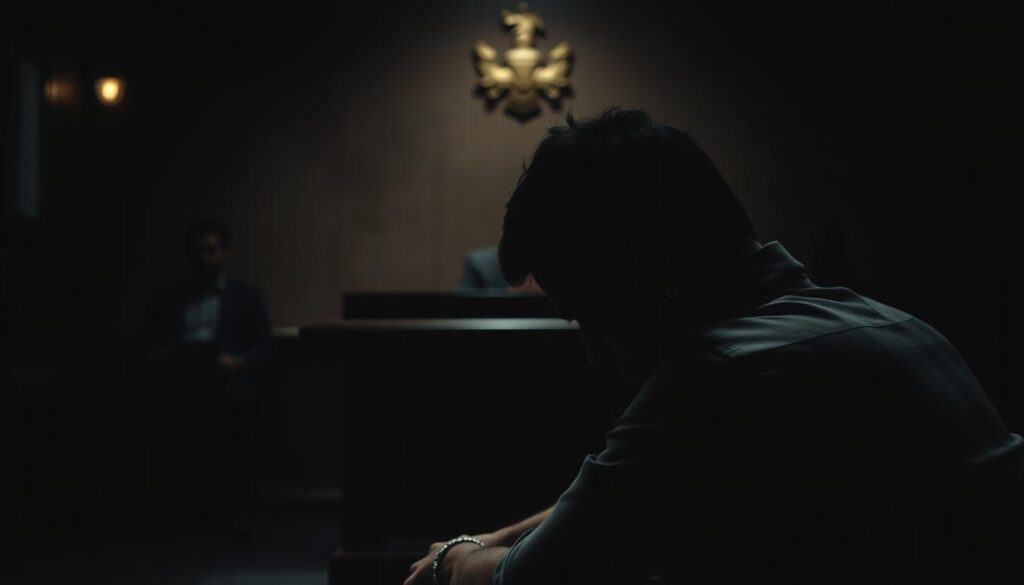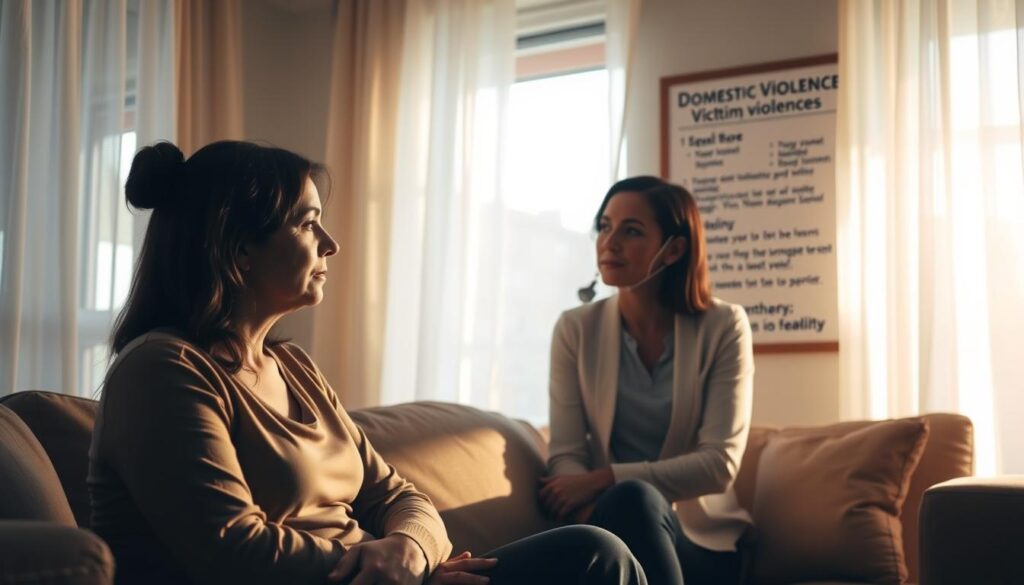Domestic abuse is more than just a headline. It can shatter lives in ways you can’t imagine. When you ask if domestic violence is a felony, the answer is not simple. It depends on many factors that can change someone’s future a lot.
Domestic abuse laws vary a lot across the United States. This creates a complex legal world. The same action can be treated differently in different states. It’s important to understand these differences to see the legal consequences of domestic violence.
The severity of domestic violence charges depends on several things. These include the nature of the offense, any past criminal history, and the specific circumstances of the incident. What might start as a misdemeanor can quickly become a felony charge with serious long-term effects.
Table of Contents
Understanding Domestic Violence Laws in America
Domestic violence is a big problem in the United States. It’s important to know the laws about it. This helps keep people safe from harm.
The laws about domestic violence vary from state to state. These laws aim to protect people in different kinds of relationships.
Definition of Domestic Violence Under Federal Law
Under federal law, domestic violence means using abuse to control someone. It includes:
- Physical abuse
- Emotional manipulation
- Sexual assault
- Economic control
- Psychological intimidation
State-by-State Variations in Domestic Violence Laws
Each state has its own way of dealing with domestic violence. For example, in Tennessee, getting caught in a third domestic assault can lead to serious felony charges.
| Offense Type | Potential Consequences |
|---|---|
| Third Domestic Assault | Class E Felony |
| Aggravated Assault | Up to 15 years imprisonment |
| Child Abuse | Class D or B Felony |
Protected Relationships Under Domestic Violence Statutes
Domestic violence laws cover mhttps://primeser.com/civil-law/any kinds of relationships. These include:
- Current and former spouses
- Intimate partners
- Family members by blood or marriage
- Cohabitating individuals
- Parents and children
Protecting victims and holding perpetrators accountable is the main goal of these laws.
Is Domestic Violence a Felony: Classification of Offenses
Figuring out when domestic violence is a felony can be tricky. The type of charge depends on several key factors. These factors change a misdemeanor into a more serious felony.
Domestic violence cases are sorted by how serious they are. A first-time case might be a misdemeanor. But, some situations can make it a felony.
- Repeat offenses within 12 months
- Serious bodily injury to the victim
- Use of a deadly weapon
- Presence of aggravating circumstances
In most places, the law looks at many things to decide if it’s a felony. The age of the person, past crimes, and details of the case are important.
| Offense Level | Potential Penalties | Typical Circumstances |
|---|---|---|
| Misdemeanor | Up to 1 year in jail | First-time offense, minimal injury |
| Third-Degree Felony | 2-10 years in prison | Repeat offenses, strangulation |
| Second-Degree Felony | 2-20 years in prison | Aggravated assault, serious injury |
| First-Degree Felony | 5-99 years in prison | Deadly weapon, severe bodily harm |
About 45% of domestic violence cases involve spouses. Most happen with non-marital partners. The most common age for perpetrators is 20 to 24 years old.
Knowing about felony domestic violence charges can help you understand the legal risks. It’s important to know the seriousness of such crimes.
Types of Domestic Violence Offenses
Domestic violence is a serious issue that affects many lives. It includes different types of abuse that can cause a lot of harm. Knowing about these types is key to spotting and stopping them. The statistics show that domestic violence impacts people from all walks of life.
- Physical Abuse
- Emotional and Psychological Abuse
- Sexual Abuse
- Economic Abuse
- Digital Abuse
Physical Abuse and Battery
Physical abuse is one of the most obvious forms of domestic violence. It involves actions like hitting, pushing, or choking. Domestic violence statistics show that physical assault is the most common type of abuse.
| Physical Abuse Type | Potential Legal Consequences |
|---|---|
| Simple Assault | Misdemeanor charges, fines, probation |
| Aggravated Assault | Felony charges, potential imprisonment |
| Battery with Weapon | Serious felony, significant jail time |
Emotional and Psychological Abuse
Emotional abuse is just as harmful. It includes things like manipulation, constant criticism, and controlling behaviors. These actions can lead to harassment charges and cause a lot of emotional pain.
Sexual Abuse and Assault
Sexual abuse in domestic situations is a serious crime. It includes forced sexual acts, sexual coercion, and rape. These acts can lead to felony charges, sex offender registration, and long prison sentences.
Learning about these types of domestic violence helps us recognize the signs and get help. If you or someone you know is going through this, call the National Domestic Violence Hotline at 800-799-SAFE (7233) for help.
Factors That Elevate Domestic Violence a Felony Status

It’s important to know when domestic violence charges become felonies. Certain factors can turn misdemeanor charges into felonies. This is crucial for understanding the legal consequences.
The severity of penalties for domestic violence depends on several key factors:
- Use of a deadly weapon during the incident
- Infliction of significant bodily harm
- Prior domestic violence convictions
- Presence of vulnerable victims (children, pregnant women, elderly)
California law provides specific guidelines for escalating domestic violence charges. For example, corporal injury to an intimate partner can be charged as either a misdemeanor or a felony under Penal Code 273.5 PC. The main differences often depend on the extent of physical injury and the incident’s circumstances.
“The legal system takes domestic violence seriously, with escalating penalties designed to protect victims and prevent repeat offenses.”
Prosecutors look at several important elements when deciding on felony domestic violence charges:
- Severity of physical injuries sustained by the victim
- History of previous domestic violence incidents
- Presence of weapons during the assault
- Psychological impact on the victim
Repeat offenders face much harsher penalties. A conviction within seven years of a previous domestic violence offense can lead to 2-5 years in state prison and fines up to $10,000.
The legal system understands that domestic violence is complex. Factors like intentional harm, injuries needing medical treatment, and repeated abuse can turn misdemeanor charges into felonies.
Legal Consequences and Penalties for Felony Domestic Violence
Domestic violence penalties can change your life a lot. They have serious legal effects that last a long time. It’s important for victims and those charged to know what might happen.
Domestic violence laws differ from state to state. Penalties can range from misdemeanors to serious felonies.
Prison Sentences and Fines
Getting legal help is key when facing jail time. In Texas, the penalties are strict:
- Class A misdemeanor: Up to 1 year in county jail
- Third-degree felony: 2-10 years imprisonment
- Second-degree felony: Up to 20 years in prison
- First-degree felony: 5-99 years of incarceration
Mandatory Intervention Programs
Courts often require special programs to help change behavior. These programs include:
- Batterer intervention counseling
- Anger management classes
- Mandatory psychological assessments
- Substance abuse treatment
Long-term Legal Implications
A domestic violence conviction can affect your life a lot:
| Area of Impact | Potential Consequences |
|---|---|
| Employment | Job loss, trouble finding future jobs |
| Housing | Rejection from rentals, public housing rules |
| Civil Rights | Loss of gun rights, voting limits |
“The consequences of a domestic violence conviction extend far beyond the courtroom.” – Legal Experts
Getting professional legal help can help deal with these tough legal issues. It might also lessen long-term effects.
Rights of Domestic Violence Victims

When facing domestic violence, knowing your legal rights is key. Support services help victims through the legal maze. They ensure your safety and aid in recovery.
Victims have many legal protections:
- Obtain protective restraining orders
- Request emergency shelter
- Seek legal representation
- Access confidential support services
- Receive medical and counseling assistance
Domestic violence resources give full support in legal battles. In California, for example, victims have specific rights. These include:
- Right to file criminal charges
- Protection from further contact with the abuser
- Victim impact statement during court hearings
- Notification of court dates and proceedings
Critically, victims can get Emergency Protective Orders (EPOs) for up to seven days. These orders protect you immediately. They can make the abuser leave and stop all contact.
Your safety is paramount, and legal systems are designed to support and protect you.
By using domestic violence support services, victims can move towards safety, healing, and justice.
Legal Defense Strategies in Domestic Violence Cases
Understanding defense strategies in domestic violence cases is key. When facing felony charges, your legal team must build strong arguments. They aim to challenge what the prosecution says.
Domestic violence cases are complex and need a strategic approach. Whether it’s a felony depends on the incident’s details and the evidence.
Self-Defense Claims
Self-defense is a vital strategy in these cases. To argue self-defense successfully, you must show:
- A reasonable belief of imminent threat
- Proportional response to the danger
- No prior provocation by the defendant
False Allegations Defense
False allegations can greatly affect domestic violence cases. Defense strategies include:
- Challenging witness credibility
- Presenting contradictory evidence
- Documenting inconsistent statements
Lack of Intent Arguments
Showing a lack of criminal intent is crucial. Key points include:
- Demonstrating accidental contact
- Proving no malicious intent
- Showing misunderstandings or miscommunications
Having a professional lawyer is vital. They can help with these strategies. They protect your rights in complex domestic violence cases.
Impact of Felony Domestic Violence on Civil Rights

Domestic violence a felony conviction has big effects that last a long time. It can change your life in many ways. It can take away your basic rights and make life hard in many areas.
Being convicted of felony domestic violence can really limit your rights. You might lose:
- the right to own guns
- your right to vote
- job opportunities
- the chance to get a place to live
- rights to see your children
There are strict rules for those convicted of domestic violence felonies. The Lautenberg Amendment says you can’t own guns. This can affect jobs in law enforcement or the military.
Being a parent can also be very hard. Courts might limit your time with your kids or take away your rights. Employers will see your conviction on background checks. This can make it hard to get jobs in places like schools, hospitals, and government.
“A single domestic violence conviction can reshape your entire future legal and social landscape.”
It’s very important to have a good lawyer if you’re accused of domestic violence. They can help protect your rights and defend you.
Prevention and Support Resources
Stopping domestic violence needs a big plan. It’s about prevention and strong support. Your help can really change things.
Many groups work hard to stop domestic violence in the U.S. They help survivors and communities a lot.
- National Coalition Against Domestic Violence (NCADV): Provides nationwide advocacy and support
- Futures Without Violence: Trains professionals to improve violence response
- National Network to End Domestic Violence (NNEDV): Offers training and funding for advocates
Local groups are key in stopping domestic violence. They offer special help for different groups, like:
- Casa de Esperanza: Supporting Latina survivors
- The North West Network: Assisting LGBTQ+ survivors
- Ujima, Inc.: Serving the Black community
Stopping domestic violence needs many ways to work. Things like education, workshops, and training help a lot.
| Resource Type | Key Services |
|---|---|
| National Hotlines | 24/7 Emergency Support |
| Counseling Services | Psychological Support |
| Legal Aid | Protection Order Assistance |
You can help stop domestic violence. Stay informed, support local groups, and spread the word. Every bit helps make a safer world for all.
Conclusion
Domestic violence laws in the US are complex and vary by state. When you ask is domestic violence a felony, the answer depends on several factors. These include the severity of the incident, any past offenses, and the specific case details.
Domestic abuse laws show the serious impact of violence at home. Penalties can range from misdemeanors to felonies. A felony charge can change your life, leading to long prison terms, big fines, and limits on freedoms like owning guns or finding a job.
It’s important to understand these laws for victims and those accused. The effects go beyond legal troubles, touching personal lives, careers, and future chances. Knowing about domestic violence laws can help stop violence and keep everyone safe.
To tackle domestic violence, we need a full approach. This includes legal actions, community support, and personal responsibility. Get legal advice, support local programs, and always value safety and respect in relationships.
FAQ
What legally defines domestic violence in the United States?
is domestic violence a felony?
What types of relationships are protected under domestic violence laws?
What are the potential legal consequences of a felony domestic violence conviction?
How can victims of domestic violence seek legal protection?
Do domestic violence laws differ between states?
What resources are available for domestic violence victims?
Can domestic violence charges be dropped by the victim?
What constitutes domestic violence beyond physical abuse?
How can someone defend against domestic violence allegations?
There are no reviews yet. Be the first one to write one.

